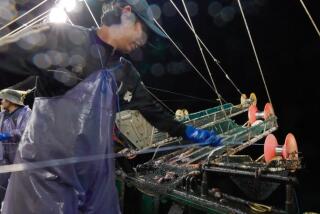This story was produced by the Outlaw Ocean Project, a nonprofit journalism organization in Washington. This article was reported and written by Ian Urbina, Joe Galvin, Maya Martin, Susan Ryan, Daniel Murphy and Austin Brush, with support from the Pulitzer Center.
- Share via
ABOARD THE SAM SIMON ON THE ATLANTIC — First, he was thirsty. Then came the seizures. Too tired to sit up, he vomited any water or food he consumed and lost the ability to urinate. His lower extremities swelled into what other deckhands described as “elephant feet.”
Fadhil, who was 24 and, like many Indonesians, did not use a surname, was working roughly 285 miles off the coast of Peru on a Chinese squid ship called the Wei Yu 18. He begged the foreman to send him back to shore for medical care. The foreman refused, instead giving him the equivalent of ibuprofen and explaining that his contract had not ended.
“My body must reach my parents,” Fadhil whispered to Ramadhan Sugandhi, another deckhand. He died the next day, Sept. 26, 2019, having been sick for a month. The captain ordered the crew to wrap Fadhil’s corpse in a blanket and place it in the squid freezer, where it turned black. Two days later, deckhands put Fadhil in a wooden coffin that was wrapped with an anchor chain to weigh it down and pushed the box into the sea. “I felt hopeless watching him,” Sugandhi said.
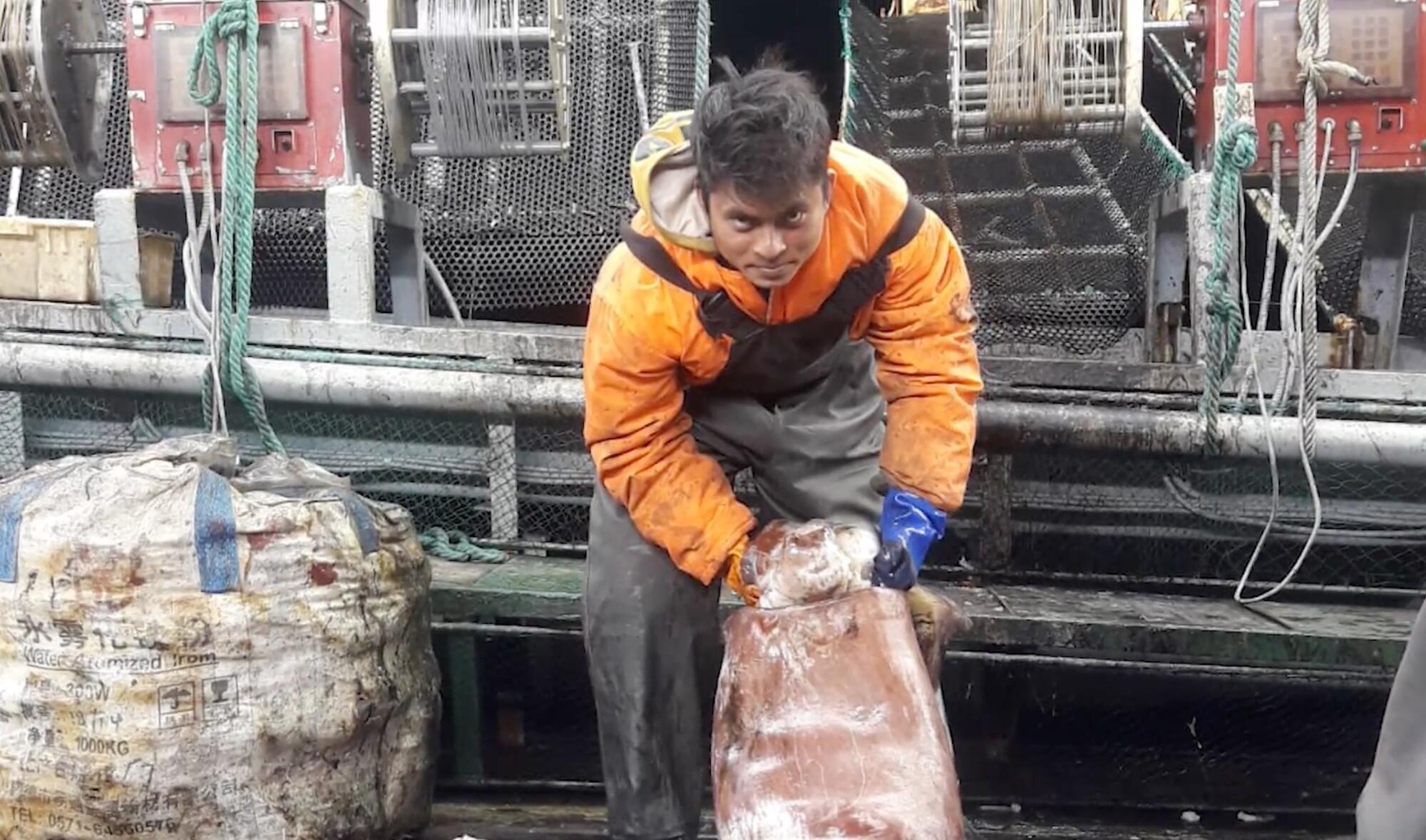
Fadhil died of a disease called beriberi, which kills an untold number of workers each year on distant-water fishing ships. The disease, which is caused by a deficiency of vitamin B1, also known as thiamine, is preventable and reversible.
“Beriberi fatality at sea is a red flag for severe neglect or captivity,” said Nicola Pocock, a specialist on the disease who teaches at the London School of Hygiene and Tropical Medicine. “There is absolutely no reason people should be getting, much less dying, from this disease.”
Beriberi is a particular concern on Chinese squid ships, which rely heavily on a strategy known as “at-sea transhipment,” in which ship captains avoid coming to shore by instead offloading their catch to refrigeration ships in the middle of the ocean. The strategy has become increasingly popular as the world’s fish stocks decline and fleets stay at sea longer in hopes of remaining profitable.

Chinese squid ships often stay at sea for two years and do not generally stock B1 supplements for their crew members, some of whom have been trafficked onto the vessels and held captive aboard. When the human body goes long periods on diets lacking B1, beriberi is more likely to occur, and it can turn fatal if not treated immediately.
Reporters for the Outlaw Ocean Project boarded more than two dozen ships in the Chinese distant-water squid fleet — some on condition that the vessels not be named — to document living and working conditions. Their investigation found that, between 2013 and 2021, at least two dozen workers on 14 ships suffered symptoms associated with beriberi. Of those, at least 15 died.

Like scurvy, which results from a deficiency of vitamin C, beriberi was common in the 19th century among sailors on extended voyages. Its name derives from a Sinhalese word, beri, meaning “weak” or “I cannot” — a term used by listless victims in what is now Sri Lanka, who were among the first patients studied by scientists. Also known as “rice disease,” beriberi has historically appeared not only on ships but also in prisons, asylums and migrant camps, where diets have consisted mainly of white rice or wheat flour, both very poor sources of B1.
For long voyages, Chinese ships typically stock rice and instant noodles because these high-carbohydrate staples are cheap, calorie-rich and slow to spoil. The problem for crews is that the human body requires more B1 when carbohydrates are consumed in large amounts and during periods of intense exertion. Unlike some countries, China does not require flour and rice to be supplemented with B1.
Making matters worse, ship cooks frequently mix in raw or fermented fish, which are high in an enzyme called thiaminase, which destroys B1.
On one Chinese squid ship on the Pacific Ocean, roughly 350 miles west of the Galapagos, the cook stood in the galley watching over a large rice cooker, flecked with small pieces of boiled squid, and a bubbling vat of instant noodles. He told a visiting reporter that the ship had no fresh fruits or vegetables.
On another Chinese squidder, located on the South Atlantic Ocean, about 370 miles north of the Falkland Islands, a deckhand in the mess hall, where the workers eat, gestured toward a bag of rotten cabbages and onions, the only vegetables on the ship. He asked for donations of any fresh fruit or vegetables.
The Outlaw Ocean Project
On the other side of the Atlantic, near Gambia, a worker from Senegal on a Chinese trawler called the Victory 205 said he had been pricked by a catfish barb while wearing flip-flops. His swollen foot, with the puncture wound oozing, looked like a rotting eggplant. As medics attended to his infection, two other deckhands approached the reporter and pointed to their lower legs, which were swollen. They said they had been at sea for several months and their swelling had begun in the last week.
“We did not get poked, but still our legs are swollen,” said one man, going on to explain that their diet for the last two months had been primarily white rice and boiled fish.
Beriberi takes two forms. “Wet” beriberi affects the cardiovascular system, can cause heart failure and typically includes symptoms of shortness of breath, increased heart rate and swelling of lower legs. “Dry” beriberi impacts the nervous system and often results in vomiting, difficulty walking, loss of feeling in hands and feet, leg muscle dysfunction and paralysis, tingling, pain and rapid eye movements.
Both forms tend to be painful and slow-acting, so victims typically see the disease coming before it kills them. “Please rescue us,” a Filipino deckhand aboard a Chinese squid ship called the Han Rong 368 pleaded in a July 2020 video, recorded on his cellphone from the Indian Ocean, near Sri Lanka. “We need to go to the hospital,” he said. “Please, we are already sick here. The captain won’t send us to the hospital.”
Between May and June 2020, three Indonesian deckhands on the ship died of symptoms associated with beriberi, including foaming at the mouth, full-body swelling and shortness of breath, according to an investigation by Greenpeace Indonesia. The bodies of two — identified in the Greenpeace report as Akhmad Wahid and Riswan — were placed in the freezer, and at least one of them was sent overboard, according to an Indonesian news report based on interviews with at least six workers and cellphone imagery obtained by journalists. The body of the third, Andri Suhendar, who suffered the symptoms for 18 days without receiving any medical care, barring some amoxicillin from the captain, was transferred onto another vessel. Kurniasih Mufidayati, an Indonesian lawmaker, said that the Indonesian government failed to protect its people from falling into conditions that left them trapped on such ships.
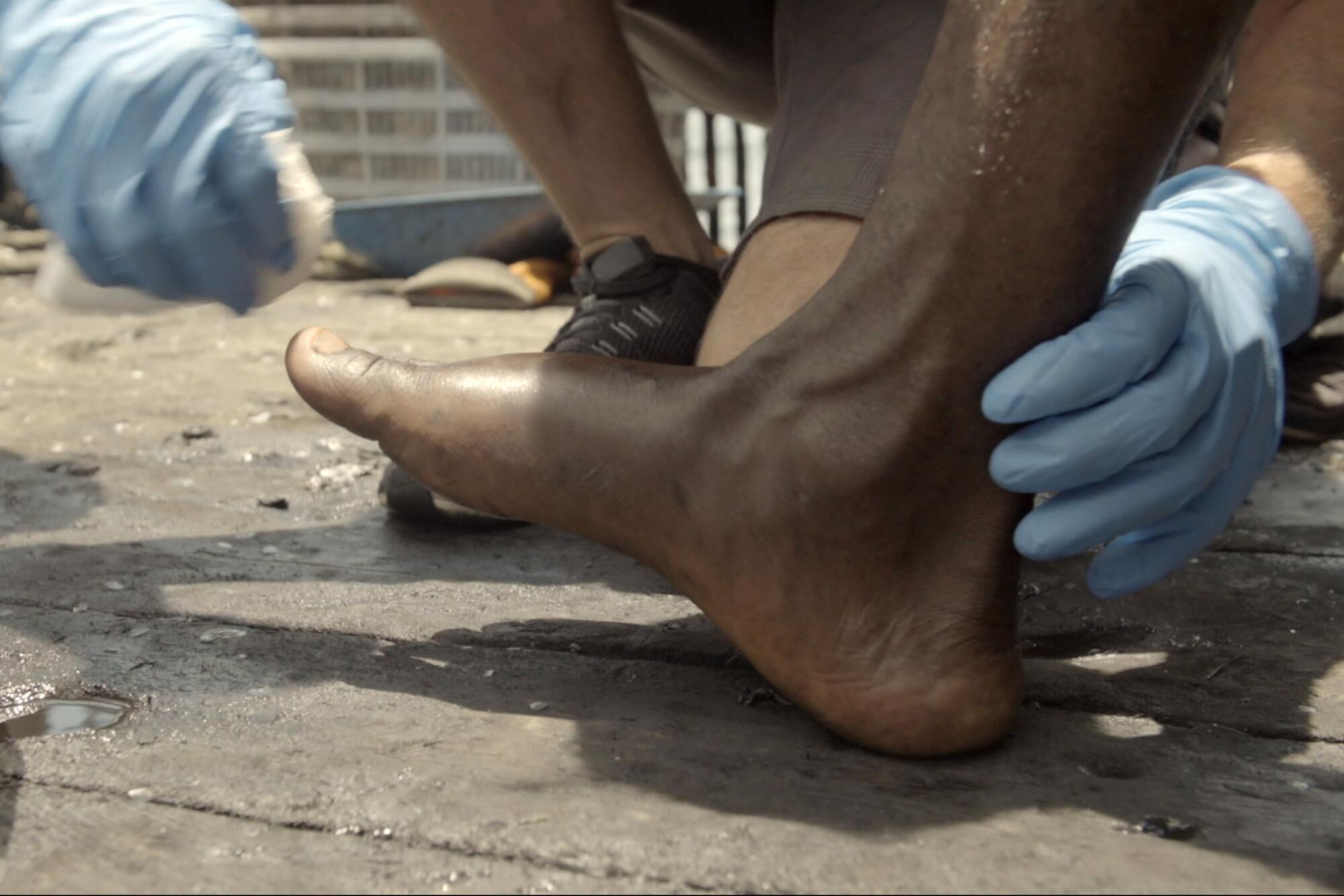
Distant-water fishing captains often refuse to carry sick or injured crew back to shore because of the cost of lost time, spent fuel and missed work. Logistics are also difficult. Swells can make it dangerous for large ships to get close to each other. Most fishing ships do not carry skiffs, which are small boats with outboard motors that enable crew transfers by traversing the water between bigger vessels. Instead, captains sometimes string up zip lines several stories above the water, connecting two ships. The men are then put inside a fishing net and sent across the open ocean.
On the rare occasions that Chinese captains airlift beriberi victims to land, it is usually when ships are near mainland China. In June 2020, for example, a Chinese deckhand experiencing full body swelling and difficulty breathing was taken by helicopter from the Fu Yuan Yu 7886, a Chinese squid ship on the South China Sea that was returning from the Indian Ocean. The ship is owned by a company that was sanctioned in 2022 by the U.S. Treasury Department for labor abuses and illegal fishing violations.
Conditions on Chinese squid ships are notoriously harsh. When these vessels visit the fishing grounds along the western shore of South America, they typically dock in Peru to restock and occasionally to allow the disembarkation of sick, injured or dead crew. Before the COVID-19 pandemic made the logistics of using foreign workers more difficult, Chinese squid ships relied heavily on such crew members, mostly from Indonesia. Rangga Yudha Nagara, an official at the Indonesian Embassy in Lima, Peru, said that since 2020 he has helped evacuate from ships and repatriate two men suffering from beriberi. “They were safe because it wasn’t too late for them to get the treatment,” he said.
When fishing on the eastern side of South America, Chinese squid ships typically restock in the Uruguayan port of Montevideo. Whereas most ports do not publish crime data, Montevideo is an exception. For most of the last decade, one body has been dropped off in this port roughly once every other month. Nicolas Potrie, who runs Indonesia’s consulate in Montevideo and gets called when dead Indonesian deckhands are brought to shore in Uruguay, said that some of the bodies show signs of beriberi and that the ship captains are often in no rush to deliver them.
“Why do they continue fishing and put the body on ice?” he asked.

In many ways, the path that landed Fadhil on the Chinese squid ship was a typical one. Like most deckhands around the world, the Indonesians on the Wei Yu 18 got their jobs through so-called manning agencies. Hundreds of these firms operate globally, playing a vital role in supplying crew members from dozens of countries to ships that are almost always on the move.
The firms handle everything from paychecks and plane tickets to port fees and passports. For the men they recruit, these firms open doors to another, more lucrative life. Hearing about the jobs through word of mouth in their villages, Fadhil and the other Indonesians traveled in July 2018 from their villages to Jakarta, where they waited for two months to board the ship.
During this time, the Indonesians signed contracts that stipulated there would be no overtime, no sick leave, 18- to 24-hour workdays, seven-day workweeks and a $50 monthly food deduction. If the fishing vessel was not near a convenient port of repatriation, the contracts permitted captains to extend their stay on board indefinitely. Captains were also granted full discretion over reassigning crew members to alternate ships. Wages were to be paid not monthly to families but in full only after completion of the contract, a practice that is illegal in many countries.
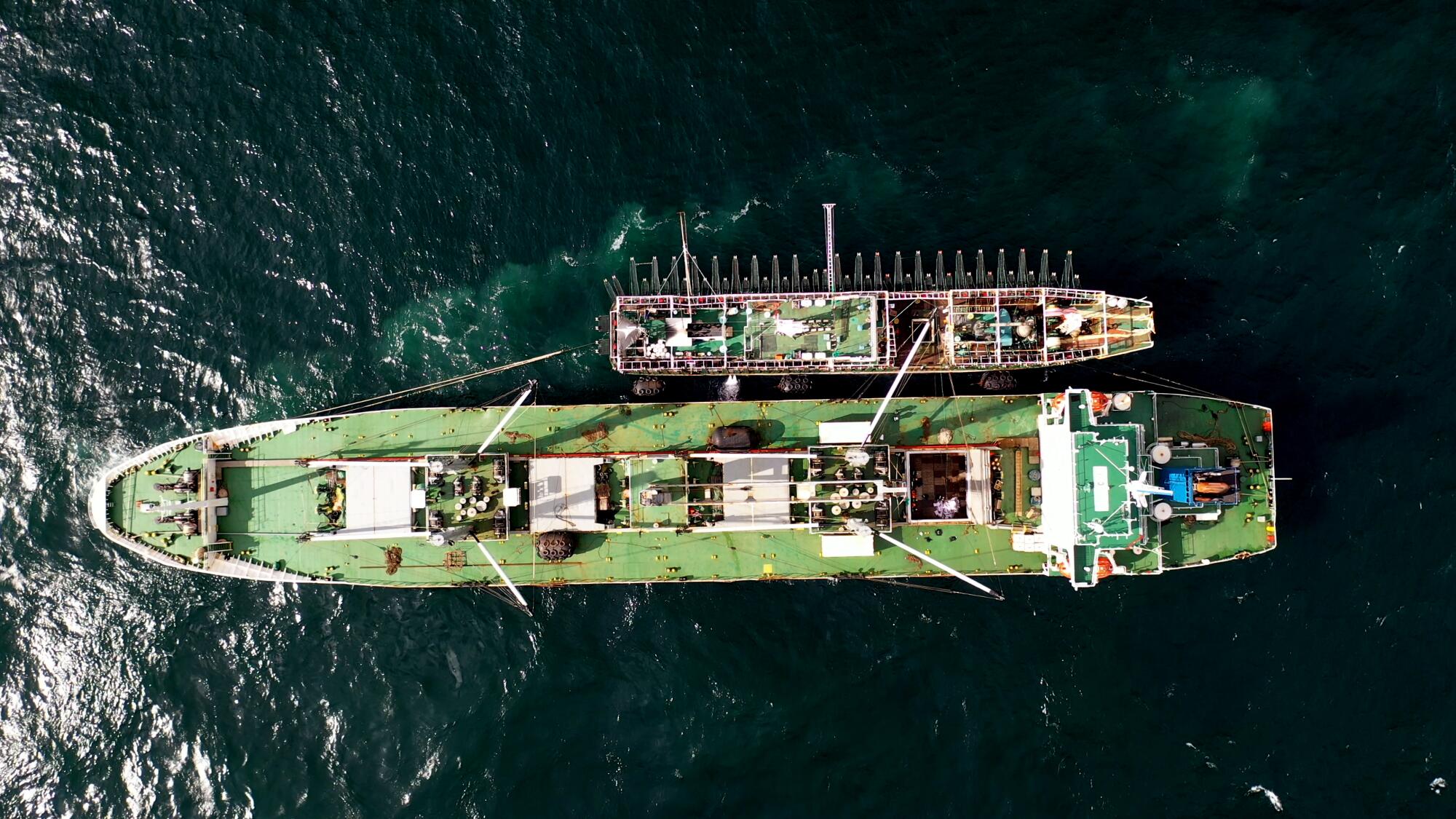
At least three of the Indonesians — but not Fadhil — on the Wei Yu 18 were recruited by a manning agency called PT Multi Maritim Indonesia. Their contracts required that they pay a processing fee of $600 for recruitment, which was to be deducted from their salary. As collateral, they were required to give the agency their school diplomas and identity cards, which were eventually to be returned to the men’s families.
Having initially been told by recruiters that they would make upward of $450 per month, the men soon learned that the actual salary would be far less, typically around $300.
This is also when the Indonesians learned about a range of salary deductions. These deductions would have been loosely explained amid a flurry of paperwork, rapid-fire calculations and unfamiliar terms: “passport forfeiture,” “mandatory fees,” “sideline earnings.” The deckhands’ contracts also included penalty clauses, which said that they would pay up to $1,000 if they left the ship before their contract expired. Some contracts also said that to collect their wages, crew members had to fly back to Indonesia at their own expense. Fishermen recruited by PT Multi Maritim Indonesia — which did not respond to requests for comment — provided reporters with their contracts and pay stubs, which showed that each had $1,000 withheld as a guarantee during their first eight months of employment. The workers also said that they had not received their promised monthly cash payments of $50.
On Aug. 28, 2018, Fadhil boarded the Wei Yu 18 in the port of Busan, South Korea, joining a crew of nine other Indonesians and 20 Chinese. The rusty red-and-white steel-hulled ship traveled for several weeks to the coast of South America to fish near Peru, then south along the coast of Chile. During its 22-month journey, the ship made only one port call, at Punta Arenas, Chile, the rest of the time staying hundreds of miles from shore. Working 12- to 24-hour shifts, the men typically slept during the day, since squid is best caught at night, with help from extremely bright light bulbs that lure the creatures toward the surface.
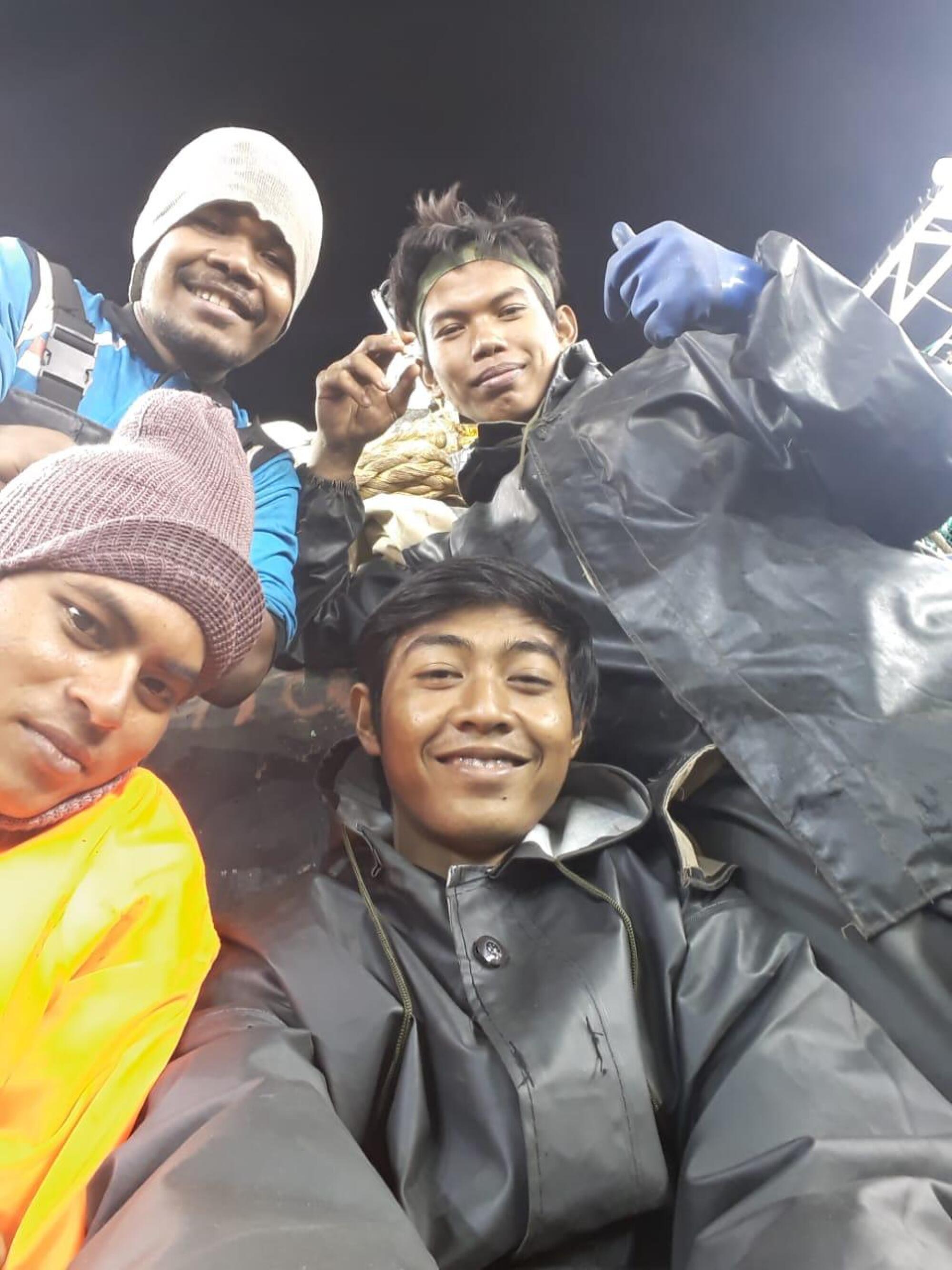
On the ship, the men slept four to a room in wooden bunk beds, each with one blanket on foam mattresses made soggy by walls that sweated with condensation. The Indonesian deckhands drank distilled salt water that was rust-colored and tasted like metal, while their Chinese counterparts were given bottled water. They were given only salt water for bathing. Since they are Muslims, the Indonesians picked out the tiny pieces of pork that the Chinese cook often mixed into the noodles he prepared.
Violence was common. The men described the foreman and the captain hitting them on the head or kicking and slapping them, usually for not understanding instructions given in Chinese, or for taking too long to untangle fishing lines or dropping squid on the deck.
By August 2019, after being at sea for over a year, the Wei Yu 18 was gripped by a rash of beriberi cases. The two Indonesian deckhands who contracted the disease first were transported by another fishing ship to shore, where they received treatment, recovered and then flew home.
The Wei Yu 18’s captain left his ship in late August to visit his family, hitching a ride on another fishing ship back to China. When Fadhil fell ill in September, he and other deckhands asked the foreman to let him go home or to the hospital but were told no. A copy of Fadhil’s contract indicates that he was required to do only one year at sea, which was already completed. But the Wei Yu 18’s foreman told Fadhil that he was required to stay for two years, according to two other deckhands. It took less than a month for Fadhil to die.
Two days later, the captain returned to the ship, and he ordered the body to be buried at sea, claiming permission from Fadhil’s parents, which incensed the Indonesians, who didn’t believe him. “Which parents are willing to throw their children out like that?” said Sugandhi, the deckhand.
In the subsequent six months, three more Indonesians fell ill with beriberi. None died because the captain contacted a nearby fishing ship, which dispatched their onboard doctor, who administered an intravenous drip, presumably with B1 supplements.

Victor Weedn, a forensic pathologist in the District of Columbia Office of the Chief Medical Examiner, said that allowing sailors to die of beriberi was akin to “slow-motion murder.”
In the U.S. legal system, it would at least constitute criminal neglect, he suggested, since the disease is so easily prevented through proper nutrition or vitamin pills, and since its symptoms can be quickly reversed with proper care. Medical studies show that when B1 is administered intravenously, patients typically recover within 24 hours.
Nearly 2½ years after Fadhil died, a reporter encountered the Wei Yu 18 in the Blue Hole fishing grounds, roughly 385 miles north of the Falkland Islands. Over the radio, a man confirmed he had been the captain of the ship for the last decade but declined to answer questions about Fadhil or to allow an inspection of his ship, citing COVID-19 concerns. “We have only a couple of fish, not many,” he said.
Export records indicate that between May 2017 and May 2022, the Wei Yu 18’s parent company, Shandong Baoma, shipped more than 140 tons of squid to the United States. Shandong Baoma’s website says that it supplies seafood to Japan, South Korea and Europe as well as to a Walmart subsidiary in China.
Various laws in the U.S. are meant to prevent products tied to forced labor from entering the American economy, but they are ineffective with seafood because there is no comprehensive import tracking system.
The Outlaw Ocean Project
In interviews, three of the Indonesian deckhands on the Wei Yu 18 said they had not worked on the high seas before nor did they realize the risks in taking work through manning agencies. A confidential investigation of the ship produced in July 2020 by C4ADS, a security research firm based in Washington, found that crews were subjected to beatings, unsanitary food and living conditions and debt bondage, concluding that there was clear evidence of forced labor. The investigation, which was reviewed by the Outlaw Ocean Project, was commissioned by a private party to look at forced labor concerns and included interviews with several deckhands from the ship.
“The Indonesian fishermen reportedly asked to leave after one year on the vessel, but they were not allowed to leave,” the report said.
Shandong Baoma did not reply to requests for comment about its alleged ties to ships engaged in human rights and illegal fishing crimes. Presented with the same findings, a spokesperson from Walmart emailed a reply: “Walmart expects all our suppliers to comply with our standards and contractual obligations, including those relating to human rights.”
In Gampong Rawa, a small coastal village on the northern tip of the island of Sumatra, about 1,500 miles northwest of Jakarta, Fadhil’s relatives received a death certificate and were promised money for life insurance and remaining wages by PT Shafar Abadi Indonesia, the manning agency that recruited him to work on board the Wei Yu 18. Fakhrurrazi, an advocate from a local legal firm, the Aceh People’s Advocacy Foundation, said he met with representatives from the agency on behalf of Fadhil’s family.
The family members were presented with a reconciliation letter that they were told was for insurance purposes. As for the cause of death, the agreement made no mention of beriberi. And despite photos of his burial at sea, the letter stated that Fadhil “died by falling into the sea.”
More to Read
Sign up for Essential California
The most important California stories and recommendations in your inbox every morning.
You may occasionally receive promotional content from the Los Angeles Times.


